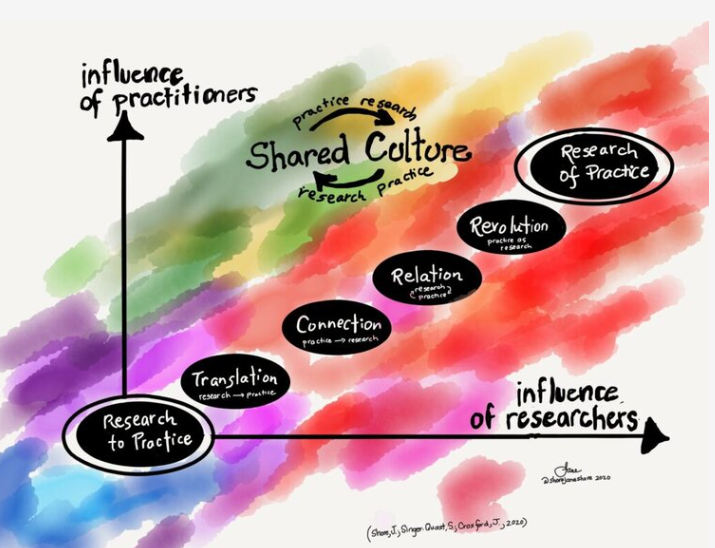Doing Transdisciplinary Research: A Collection of Articles
The Methodspace focus for February 2021 is on research that crosses boundaries.
While interdisciplinary, multidisciplinary, or cross-disciplinary research involves different levels of integration of discipline-based epistemologies and methodologies, transdisciplinary research practice that transcends conventional disciplines, sometimes innovating a new field of study. Just as an artist finds unique shades of purple when red paint is added to blue, transdisciplinary researchers meld ideas and practices and create new approaches. This selection of open-access articles introduces a variety of perspectives on transdisciplinary research.
Deschepper, R., Six, S., Vandeweghe, N., De Couck, M., Gidron, Y., Depoorter, A.-M., & Bilsen, J. (2017). Linking numbers to perceptions and experiences: Why we need transdisciplinary mixed-methods combining neurophysiological and qualitative data. Criminal Justice and Behavior, 10(2), 1609–1629. https://doi.org/10.1177/0093854820953449
Abstract. Today, more and more problems that scientists need to tackle are complex problems. Many examples of these can be found in the health sciences, medicine and ecology. Typical features of complex problems are that they cannot be studied by one discipline and that they need to take into account subjective data as well as objective data. Two promising responses to deal with complex problems are Transdisciplinary and Mixed Method approaches. However, there is still a lacuna to fill, with transdisciplinary studies bridging the social sciences and biomedical sciences. More specifically, we need more and better studies that combine qualitative data about subjective experiences, perception and so on with objective, quantitative, neurophysiological data. We believe that the combination of qualitative and neurophysiological data is a good example of what we would like to call transdisciplinary mixed methods. In this article, we aim to explore the opportunities of transdisciplinary mixed-methods studies in which qualitative and neurophysiological data are used. We give a brief overview of what is characteristic for this kind of studies and illustrate this with examples; we point out strengths and limitations and propose an agenda for the future. We conclude that transdisciplinary mixed-methods studies in which qualitative and neurophysiological data are used have the potential to improve our knowledge about complex problems. A main obstacle seems to be that most scientists from the biomedical sciences are not familiar with the (qualitative) methods from the social sciences and vice versa. To end this ‘clash of paradigms’™, we urgently need to cultivate transdisciplinary thinking.
Ellington, R., Barajas, C. B., Drahota, A., Meghea, C., Uphold, H., Scott, J. B., Lewis, E. Y., & Furr-Holden, C. D. (2022). An Evaluation Framework of a Transdisciplinary Collaborative Center for Health Equity Research. American Journal of Evaluation. https://doi.org/10.1177/1098214021991923
Abstract. Over the last few decades, there has been an increase in the number of large federally funded transdisciplinary programs and initiatives. Scholars have identified a need to develop frameworks, methodologies, and tools to evaluate the effectiveness of these large collaborative initiatives, providing precise ways to understand and assess the operations, community and academic partner collaboration, scientific and community research dissemination, and cost-effectiveness. Unfortunately, there has been limited research on methodologies and frameworks that can be used to evaluate large initiatives. This study presents a framework for evaluating the Flint Center for Health Equity Solutions (FCHES), a National Institute of Minority Health and Health Disparities (NIMHD)-funded Transdisciplinary Collaborative Center (TCC) for health disparities research. This report presents a summary of the FCHES evaluation framework and evaluation questions as well as findings from the Year-2 evaluation of the Center and lessons learned.
Lam, S., Thompson, M., Johnson, K., Fioret, C., & Hargreaves, S. K. (2021). Toward community food security through transdisciplinary action research. Action Research, 19(4), 656–673. https://doi.org/10.1177/1476750319889390
Abstract. To solve the world’s most complex problems, research is increasingly moving toward more transdisciplinary endeavors. While a lot of important work has explored the characteristics, challenges, opportunities, and operationalization of transdisciplinary research, much less is known about the circumstances that either facilitate or hinder the research process, particularly from the perspectives of graduate students who often participate in them. In this paper, we aim to address this gap by contributing our own experiences as a team of four graduate students and one community partner that collaborated on a food security project. To support our collaboration, we develop and apply an analytical framework that integrates transdisciplinarity and action research. Through principles of reflexivity, participation and partnership, methods and process, and integration, we find that the framework facilitated the development of shared purposes, mutual responsibility, and meaningful relationships, resulting in the co-creation of a guidebook for farmer-led research. Our main concern with the framework is not achieving the full integration of our disciplines and practices. Transdisciplinarity together with action research holds significant promise in a food security context, but only in the “right” circumstances, where considerable time is spent building relationships, opening communicative space, and reflecting on the work with collaborators.
Lippert, F. (2019). Public self-reflection in the context of the European migrant crisis: Towards a new transdisciplinary model of discourse analysis in politics, media and the arts. Journal of European Studies, 49(3–4), 336–353. https://doi.org/10.1177/0047244119859173
Abstract. While the European migrant crisis is omnipresent in political and medial discourses, two of its key causes are only seldom addressed by politicians and journalists: mistakes in Europe’s domestic, foreign and development policies; and Eurocentric, clichéd or ill-informed press coverage on migration. What impedes such political and medial self-criticism? What happens if politicians or journalists publicly address their own mistakes? Creative culture, in turn, has a long tradition of public self-reflexivity. In the wake of the crisis, many literary texts and films self-critically reflect on the literary and filmic framing of migrants, and challenge the political and medial ‘externalization’ of the crisis. Building upon these observations, this contribution suggests a new direction for discursive research: the analysis of self-criticism as an ethical challenge for public communication. It highlights research desiderata, discusses the theoretical foundations for comparing self-reflexivity across discourses, and outlines a transdisciplinary terminology and exemplary methods for future research.
Osborne, P. (2015). Problematizing Disciplinarity, Transdisciplinary Problematics. Theory, Culture & Society, 32(5–6), 3–35. https://doi.org/10.1177/0263276415592245
Abstract. This article situates current debates about transdisciplinarity within the deeper history of academic disciplinarity, in its difference from the notions of inter- and multi-disciplinarity. It offers a brief typology and history of established conceptions of transdisciplinarity within science and technology studies. It then goes on to raise the question of the conceptual structure of transdisciplinary generality in the humanities, with respect to the incorporation of the 19th- and 20th-century German and French philosophical traditions into the anglophone humanities, under the name of ‘theory’. It identifies two distinct – dialectical and anti-dialectical, or dialectical and transversal – transdisciplinary trajectories. It locates the various contributions to the special issue of which it is the introduction within this conceptual field, drawing attention to the distinct contribution of the French debates about structuralism and its aftermath – those by Serres, Foucault, Derrida, Guattari and Latour, in particular. It concludes with an appendix on Foucault’s place within current debates about disciplinarity and academic disciplines.
Schaich Borg, J. (2021). Four investment areas for ethical AI: Transdisciplinary opportunities to close the publication-to-practice gap. Big Data & Society. https://doi.org/10.1177/20539517211040197
Abstract. Big Data and Artificial Intelligence have a symbiotic relationship. Artificial Intelligence needs to be trained on Big Data to be accurate, and Big Data's value is largely realized through its use by Artificial Intelligence. As a result, Big Data and Artificial Intelligence practices are tightly intertwined in real life settings, as are their impacts on society. Unethical uses of Artificial Intelligence are therefore a Big Data problem, at least to some degree. Efforts to address this problem have been dominated by the documentation of Ethical Artificial Intelligence principles and the creation of technical tools that address specific aspects of those principles. However, there is mounting evidence that Ethical Artificial Intelligence principles and technical tools have little impact on the Artificial Intelligence that is created in practice, sometimes in very public ways. The goal of this commentary is to highlight four interconnected areas society can invest in to close this Ethical Artificial Intelligence publication-to-practice gap, maximizing the positive impact Artificial Intelligence and Big Data have on society. For Ethical Artificial Intelligence to become a reality, I argue that these areas need to be addressed holistically in a way that acknowledges their interdependencies. Progress will require iteration, compromise, and transdisciplinary collaboration, but the result of our investments will be the realization of Artificial Intelligence's and Big Data's tremendous potential for social good, in practice rather than in just our hopes and aspirations.
Simon, D., Palmer, H., Riise, J., Smit, W., & Valencia, S. (2018). The challenges of transdisciplinary knowledge production: from unilocal to comparative research. Environment and Urbanization, 30(2), 481–500. https://doi.org/10.1177/0956247818787177
Abstract. This reflective paper surveys the lessons learnt and challenges faced by the Mistra Urban Futures (MUF) research centre and its research platforms in Sweden, the UK, South Africa and Kenya in developing and deploying different forms of transdisciplinary co-production of knowledge. Considerable experience with a distinctive portfolio of such methods has been gained and reflective evaluation is now under way. While it is important to understand the local context within which each method has evolved, we seek to explain the potential for adaptation in diverse contexts so that such knowledge co-production methods can be more widely utilized. Furthermore, the current phase of MUF’s work is undertaking innovative comparative transdisciplinary co-production research across its research platforms. Since the specific local projects differ, systematic thematic comparison requires great care and methodological rigour. Transdisciplinary co-production is inherently complex, time consuming and often unpredictable in terms of outcomes, and these challenges are intensified when it is undertaken comparatively.
Wheeler, S. L. (2018). Autoethnographic onomastics: Transdisciplinary scholarship of personal names and ‘our-stories.’ Methodological Innovations, 11(1). https://doi.org/10.1177/2059799118769818
Abstract. Names are entwined with the languages and cultures from which they emanate, providing useful starting points for ethnographic exploration. The study of names can broadly be referred to as onomastics. However, the field is fractured by disciplinary and methodological divisions. Consequently, the study of names has not developed to the extent which might be expected for a phenomenon of such social significance. Furthermore, the emotional aspects of names and naming are largely absent from the literature. Autoethnography may be a useful methodology for bridging disciplinary and methodological divisions, bringing interesting and insightful data to the study of names and naming.













The Director and Assistant Director of the Bass Connections program at Duke University share lessons learned and open access resources for team success in interdisciplinary collaborative research.